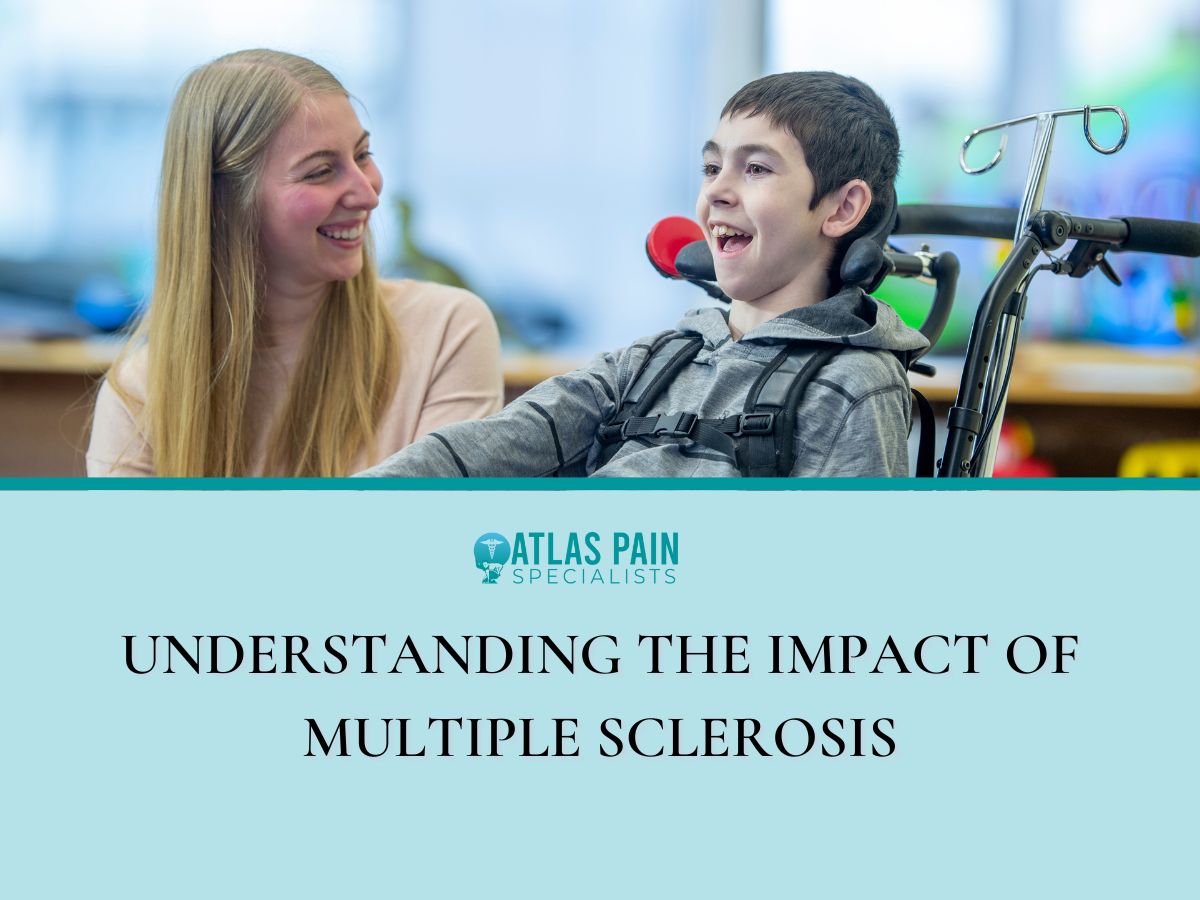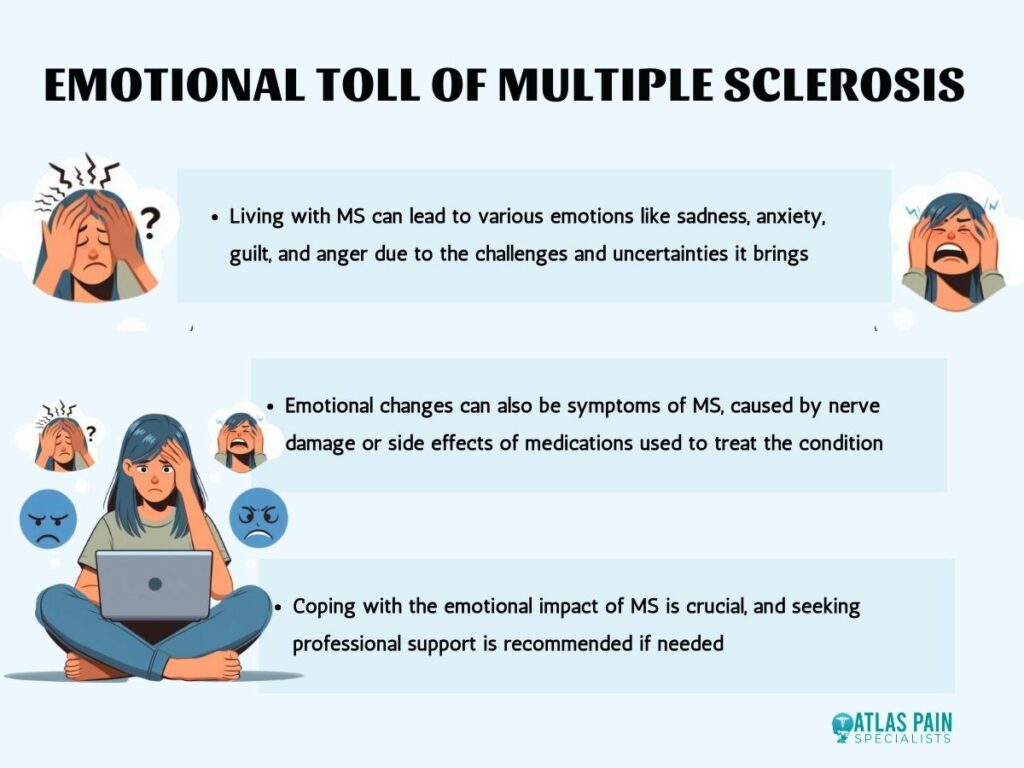

Understanding the Impact of Multiple Sclerosis
Multiple Sclerosis (MS) is a complex neurological condition that affects millions of people worldwide. Beyond the physical symptoms, MS can have profound impacts on various aspects of life, including cognitive function, mental health, employment, relationships, and financial stability.
Understanding these challenges is essential for individuals living with MS, their caregivers, healthcare providers, and society as a whole. In this blog, we will delve into the various dimensions of living with MS, exploring its emotional toll, social dynamics, physical limitations, cognitive changes, and the crucial role of advocacy in raising awareness and promoting research for better treatments. Let's now look at the impact of multiple sclerosis.

Emotional Toll of Multiple Sclerosis
Living with MS can bring about a rollercoaster of emotions. Anxiety and depression are common companions for many individuals grappling with this condition. The uncertainty of the disease progression, unpredictable symptoms, and the potential for disability can fuel anxiety.
Depression may stem from the challenges of adjusting to life with a chronic illness, as well as the physical limitations and changes in lifestyle.
Coping mechanisms become essential tools for navigating the emotional landscape of MS. Engaging in activities that bring joy and fulfillment, such as hobbies, creative outlets, or spending time with loved ones, can provide moments of respite from the challenges.
Seeking support from mental health professionals, support groups, or online communities can offer validation, understanding, and coping strategies tailored to the unique experiences of living with MS.
Social Impact and Relationships
MS doesn't just affect the individual diagnosed; it reverberates through their social circles, influencing relationships with family, friends, and colleagues.
Family Dynamics
MS can strain family dynamics as roles may shift due to the changing needs of the individual with MS. Family members may grapple with feelings of helplessness or guilt, while the person with MS may struggle with feelings of dependence or inadequacy.
Open communication, mutual support, and adaptability are vital for maintaining healthy familial relationships amidst the challenges of MS.
Friendships
Friendships may evolve as the dynamics of social interactions change. Some friends may step up to provide unwavering support, while others may struggle to understand or cope with the realities of MS.
It's common for individuals with MS to experience feelings of isolation or abandonment as friendships shift. Honest communication about needs and boundaries can help foster understanding and maintain meaningful connections.
Workplace Relationships
MS can also impact relationships in the workplace. Colleagues may struggle to comprehend the fluctuating nature of MS symptoms, leading to misconceptions or stigmatization.
Individuals with MS may face challenges in disclosing their condition due to fears of discrimination or lack of understanding. Open dialogue and workplace accommodations can facilitate a supportive environment where individuals with MS can thrive professionally.
Employment and Financial Challenges
MS can significantly impact employment opportunities and financial stability due to its unpredictable nature and the potential for physical and cognitive limitations.
Career Choices
Individuals with MS may face difficult decisions regarding their careers. The fluctuating nature of MS symptoms can make it challenging to maintain consistent employment, leading some to reconsider their career paths or make adjustments to accommodate their health needs.
This may involve transitioning to less physically demanding roles, seeking flexible work arrangements, or exploring alternative career options that align with their abilities and limitations.
Employment Opportunities
Discrimination and stigma surrounding disabilities, including MS, can pose barriers to securing and maintaining employment. Some employers may be unwilling or unable to provide necessary accommodations, leading to challenges in finding suitable work environments.
Individuals with MS may experience gaps in their employment history due to periods of illness or disability, which can further hinder their job prospects.
Financial Stability
The impact of MS on employment can have ripple effects on financial stability. Reduced earning potential, increased medical expenses, and potential reliance on disability benefits can strain financial resources.
Managing finances becomes crucial for individuals with MS and their families, necessitating careful budgeting, financial planning, and exploring resources for assistance.
Physical Limitations and Lifestyle Adjustments
MS can impose various physical limitations that require individuals to make significant lifestyle adjustments to manage their symptoms and maintain their well-being.

- Mobility Issues: Issues such as muscle weakness, balance problems, and coordination issues can affect mobility, making tasks like walking, climbing stairs, or driving more challenging. Mobility aids such as canes, walkers, or wheelchairs may be necessary to navigate daily life effectively.
- Fatigue: Unlike ordinary tiredness, MS-related fatigue may not improve with rest and can occur suddenly or persistently. Managing fatigue often involves balancing activities, prioritizing tasks, pacing oneself, and incorporating rest breaks into daily routines.
- Pain: Chronic pain is another common symptom of MS, affecting various parts of the body, such as the back, limbs, or face. Pain management strategies may include medications, physical therapy, relaxation techniques, or alternative therapies to alleviate discomfort and improve overall well-being.
- Lifestyle Adjustments: Living with MS often requires individuals to adapt their lifestyles to accommodate their changing needs and abilities. This may involve making modifications to the home environment to enhance accessibility and safety, seeking assistance with daily tasks, and prioritizing self-care activities such as exercise, nutrition, and stress management.
Cognitive Function and Mental Health
Living with Multiple Sclerosis (MS) not only affects physical health but also cognitive function and mental health. Understanding the cognitive changes, memory issues, and the importance of advocacy is crucial for individuals with MS and their support networks.
Cognitive Function and Memory Issues
MS can impact cognitive function, leading to difficulties with memory, concentration, information processing, and problem-solving.
- Memory Issues: Many individuals with MS experience memory difficulties, such as short-term memory loss or problems with retrieving information. These memory issues can affect daily tasks, work performance, and interpersonal relationships. Strategies such as using calendars, reminders, and organization techniques can help mitigate memory challenges and improve daily functioning.
- Attention and Concentration: MS can also affect attention and concentration, making it challenging to stay focused on tasks or conversations. Individuals may find themselves easily distracted or struggling to maintain attention for prolonged periods. Breaking tasks into smaller, manageable steps and minimizing distractions can support attention and concentration.
- Information Processing: Processing information may become slower or less efficient in individuals with MS. This can manifest as delays in understanding and responding to verbal or written communication. Strategies such as taking breaks, using visual aids, and practicing mindfulness techniques can aid in processing information more effectively.
- Problem-Solving Skills: MS can impact problem-solving abilities, making it harder to navigate complex situations or make decisions. Individuals may find it helpful to break problems down into smaller components, seek input from others, and utilize problem-solving techniques such as brainstorming or decision-making frameworks.
Mental Health
Mental health is a critical aspect of living with MS, as individuals may experience a range of emotional challenges, including depression, anxiety, and adjustment disorders.
Depression
Depression is common among individuals with MS and can stem from factors such as the impact of the disease on daily life, changes in roles and relationships, and neurological changes affecting mood regulation.
Symptoms of depression may include persistent sadness, loss of interest in activities, changes in appetite or sleep, and feelings of hopelessness. Seeking support from mental health professionals and engaging in therapy or support groups can help manage depression symptoms.
Anxiety
Anxiety is another prevalent mental health issue in individuals with MS, often fueled by uncertainty about the future, fear of symptom progression, and worries about managing daily challenges.
Symptoms of anxiety may include excessive worry, restlessness, irritability, and physical symptoms such as palpitations or muscle tension. Learning relaxation techniques, practicing mindfulness, and seeking therapy can assist in managing anxiety symptoms.
Advocacy and Community Engagement
Advocacy plays a vital role in raising awareness about MS, promoting research for better treatments, and advocating for the needs of individuals affected by the disease.
- Raising Awareness: Advocacy efforts aim to increase understanding of MS among the general public, healthcare professionals, policymakers, and the media. By raising awareness about the impact of MS on cognitive function, mental health, and overall well-being, advocates can reduce stigma, foster empathy, and promote inclusivity.
- Promoting Research: Advocacy efforts also advocate for increased funding and support for MS research, including studies focused on cognitive function, mental health interventions, and symptom management. By advocating for research initiatives, individuals and organizations can contribute to the development of more effective treatments, improved quality of life, and ultimately, a cure for MS.
- Community Engagement: Engaging with the MS community through support groups, online forums, and advocacy organizations provides a sense of belonging, validation, and mutual support. By connecting with others who understand their experiences, individuals with MS can access valuable resources, share coping strategies, and advocate for their needs collectively.
Conclusion
Living with Multiple Sclerosis presents a myriad of challenges that extend far beyond the realm of physical health. From navigating the emotional rollercoaster of anxiety and depression to managing the social dynamics of relationships and employment, individuals with MS face unique hurdles on a daily basis.
Coping with cognitive changes, memory issues, and mental health concerns adds further complexity to the MS journey. However, through advocacy, community support, and a deeper understanding of the multifaceted impacts of MS, we can strive to create a more inclusive and supportive environment for those affected by the condition.
By fostering empathy, raising awareness, and advocating for research, we can work towards a future where individuals with MS can lead fulfilling lives with dignity, resilience, and hope.
About Dr. Sean Ormond



